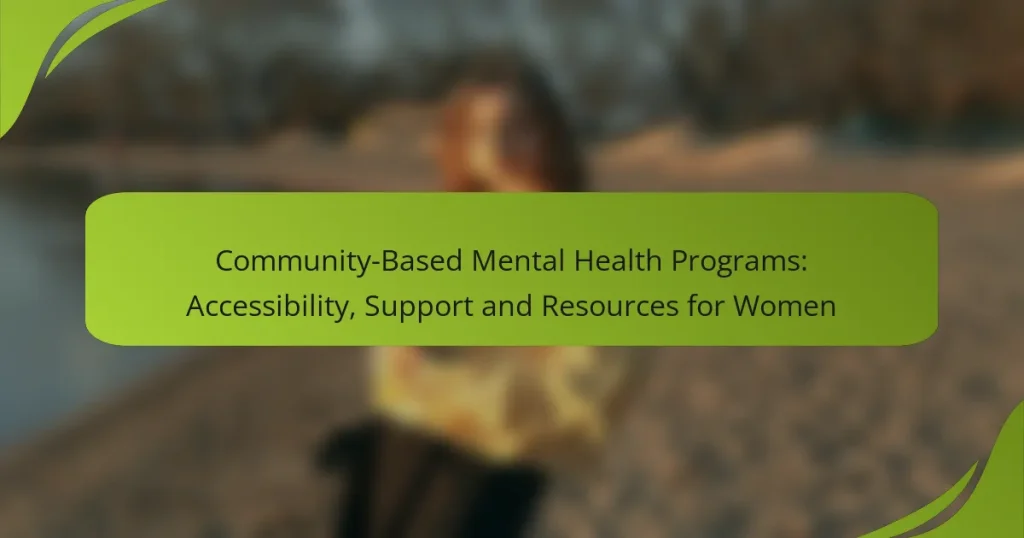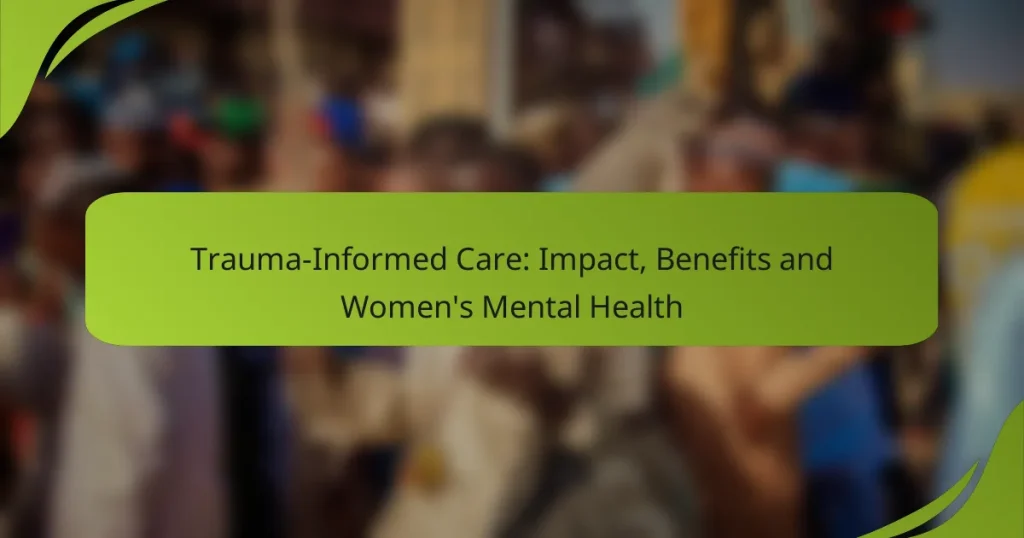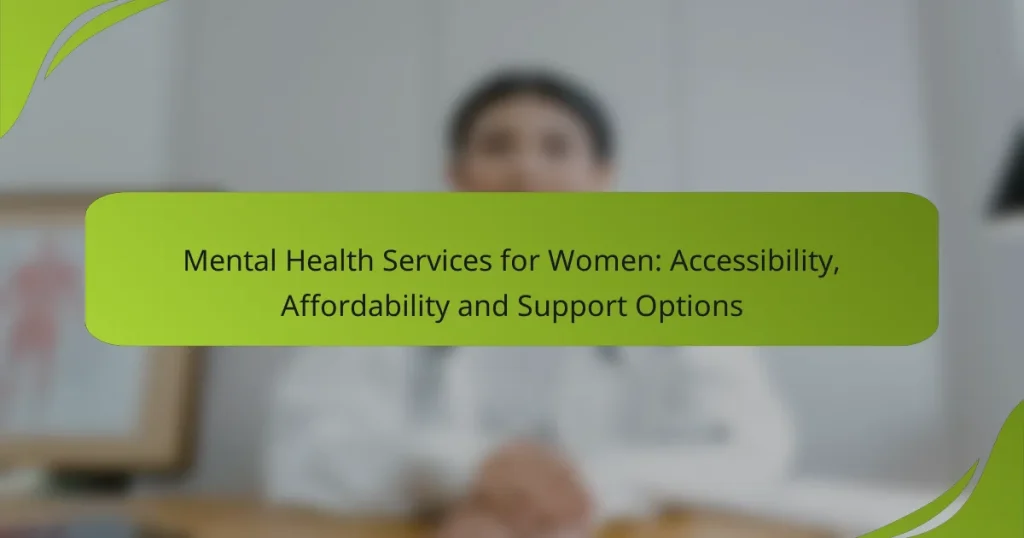Women’s health and rights initiatives play a crucial role in enhancing mental health support tailored to the unique challenges women encounter. By offering a range of programs, from community counseling to online resources, these initiatives ensure that women have accessible options for seeking help. Advocacy organizations further contribute by raising awareness and providing essential resources to improve mental health services for women.
Community-Based Mental Health Programs: Accessibility, Support and Resources for Women
Therapy Options for Women: In-Person and Online Counseling
Mental Health Support: Benefits, Strategies and Women’s Health Initiatives
Peer Support Groups: Role, Benefits and Women’s Mental Health
Trauma-Informed Care: Impact, Benefits and Women’s Mental Health
Mental Health Services for Women: Accessibility, Affordability and Support Options
What are effective mental health support initiatives for women?
Effective mental health support initiatives for women include various programs and resources designed to address their unique needs. These initiatives can range from community counseling to online platforms, providing accessible options for women seeking help.
Community-based counseling programs
Community-based counseling programs offer localized support tailored to women’s mental health. These programs often include trained counselors who understand the specific challenges women face, such as trauma, domestic violence, or work-life balance issues.
Many of these initiatives operate on a sliding scale, making them affordable for low-income individuals. Women can benefit from group sessions or one-on-one counseling, fostering a sense of belonging and support within their communities.
Online therapy platforms
Online therapy platforms provide convenient access to mental health professionals through digital means. These platforms often feature licensed therapists who specialize in women’s issues, allowing for flexible scheduling and anonymity.
Women can choose from various formats, including video calls, chat, or voice calls. Some platforms offer subscription models, making therapy more affordable compared to traditional in-person sessions.
Support groups for women
Support groups for women create safe spaces for sharing experiences and coping strategies. These groups can focus on specific topics, such as postpartum depression, anxiety, or career-related stress, allowing participants to connect with others facing similar challenges.
Facilitated by trained professionals or peers, these groups encourage open dialogue and provide emotional support. Many organizations offer free or low-cost options, making them accessible to a wider audience.
Workplace mental health resources
Workplace mental health resources are essential for supporting women’s mental well-being in professional environments. Many companies now provide employee assistance programs (EAPs) that offer confidential counseling services and mental health resources.
Employers can also implement wellness programs that promote work-life balance, stress management workshops, and mental health days. These initiatives help create a supportive workplace culture that prioritizes mental health.
Telehealth services
Telehealth services have become increasingly popular for delivering mental health care to women. These services allow women to consult with mental health professionals from the comfort of their homes, reducing barriers such as transportation and time constraints.
Many telehealth platforms are compliant with regulations like HIPAA, ensuring confidentiality and security. Women can access a range of services, including therapy, medication management, and crisis intervention, making mental health support more accessible than ever.
How do women’s health initiatives impact mental health?
Women’s health initiatives significantly enhance mental health by providing targeted support and resources. These programs address the unique challenges women face, leading to improved emotional well-being and resilience.
Improved access to resources
Access to mental health resources is crucial for women, especially in underserved areas. Initiatives often include community clinics, telehealth services, and support groups that make it easier for women to seek help. For example, programs may offer free or low-cost therapy sessions, which can reduce financial barriers to care.
Additionally, these initiatives can connect women with essential resources such as hotlines, counseling services, and wellness programs. By increasing availability, women are more likely to engage with mental health services and receive the support they need.
Increased awareness of mental health issues
Raising awareness about mental health issues is a key component of women’s health initiatives. Campaigns that educate women about mental health conditions help to destigmatize seeking help and encourage open discussions. This awareness can lead to earlier identification of mental health challenges and timely intervention.
Workshops and community events often focus on topics such as anxiety, depression, and stress management, equipping women with knowledge and coping strategies. Increased awareness fosters a supportive environment where women feel empowered to prioritize their mental health.
Empowerment through education
Education plays a vital role in empowering women to take charge of their mental health. Women’s health initiatives often provide educational resources that teach coping skills, self-care practices, and stress reduction techniques. This knowledge enables women to make informed decisions about their mental well-being.
Programs may include seminars, online courses, and informational materials that focus on mental health literacy. By understanding the signs of mental health issues and effective coping mechanisms, women can advocate for themselves and seek appropriate care when needed.
What organizations support women’s mental health rights?
Several organizations focus on advocating for women’s mental health rights, providing resources, support, and education. These groups aim to improve mental health services and raise awareness about the unique challenges women face.
National Women’s Health Network
The National Women’s Health Network (NWHN) is dedicated to promoting women’s health rights and ensuring access to quality mental health care. They advocate for policies that support women’s mental health and provide educational resources to empower women in making informed health decisions.
NWHN also engages in research and public policy initiatives aimed at improving mental health services for women. Their work includes addressing issues such as reproductive health, mental health stigma, and access to care.
Women’s Mental Health Consortium
The Women’s Mental Health Consortium is a collaborative network that brings together professionals and advocates to enhance mental health services for women. They focus on research, education, and advocacy to address the specific mental health needs of women across various life stages.
This organization emphasizes the importance of integrating mental health care into women’s health services, ensuring that mental health is prioritized alongside physical health. They also provide training and resources for healthcare providers to better support women’s mental health.
American Psychological Association
The American Psychological Association (APA) plays a significant role in promoting women’s mental health through research, education, and advocacy. They publish guidelines and resources that address the unique mental health challenges faced by women, including issues related to trauma, depression, and anxiety.
APA also supports initiatives that aim to reduce stigma around mental health and improve access to psychological services for women. Their efforts include public awareness campaigns and collaborations with other organizations to enhance mental health care delivery.
What are the barriers to accessing mental health support for women?
Women face several barriers when trying to access mental health support, including stigma, lack of insurance coverage, and geographic limitations. These obstacles can prevent them from seeking help and receiving the care they need.
Stigma surrounding mental health
Stigma is a significant barrier that affects women’s willingness to seek mental health support. Many women fear judgment from family, friends, or colleagues, which can lead to feelings of shame and isolation. This stigma can discourage them from discussing their mental health issues or pursuing treatment.
To combat stigma, awareness campaigns and community support groups can play a vital role. Encouraging open conversations about mental health can help normalize these discussions and reduce the associated shame.
Lack of insurance coverage
Many women struggle to access mental health services due to inadequate insurance coverage. In some regions, mental health care may not be included in standard health plans, leading to high out-of-pocket costs. This financial burden can deter women from seeking necessary treatment.
Women should explore their insurance options and understand their coverage for mental health services. In some cases, sliding scale fees or community mental health programs may offer affordable alternatives.
Geographic limitations
Geographic limitations can significantly hinder women’s access to mental health support, especially in rural or underserved areas. Limited availability of mental health professionals can result in long wait times or the need to travel long distances for care.
Telehealth services have emerged as a valuable solution, allowing women to connect with mental health professionals remotely. Utilizing online therapy options can help bridge the gap for those in remote locations, making mental health support more accessible.
How can technology improve women’s mental health support?
Technology enhances women’s mental health support by providing accessible, personalized, and immediate resources. Digital tools can bridge gaps in traditional care, making it easier for women to seek help and manage their mental well-being.
Mobile health applications
Mobile health applications offer women convenient access to mental health resources, including therapy sessions, mood tracking, and mindfulness exercises. Many apps are designed with user-friendly interfaces and can be customized to meet individual needs, allowing for a personalized approach to mental health management.
Popular apps often include features such as guided meditations, daily check-ins, and community support forums. These tools can help women monitor their mental health and connect with others facing similar challenges, fostering a sense of community.
Virtual reality therapy
Virtual reality (VR) therapy immerses users in controlled environments to address various mental health issues, such as anxiety and PTSD. This technology allows women to confront their fears in a safe space, which can lead to significant improvements in coping strategies and emotional resilience.
VR therapy sessions can be tailored to individual experiences, making them particularly effective for women who may feel uncomfortable in traditional therapy settings. As VR technology becomes more accessible, it offers a promising avenue for innovative mental health support.
AI-driven mental health assessments
AI-driven mental health assessments utilize algorithms to analyze user responses and provide insights into mental health status. These assessments can quickly identify symptoms and suggest appropriate resources or interventions, streamlining the process of seeking help.
While AI tools can enhance the efficiency of mental health evaluations, it is crucial to ensure that they are used alongside professional guidance. Women should be cautious of relying solely on AI assessments and should seek follow-up consultations with mental health professionals for comprehensive care.
What role do cultural factors play in women’s mental health?
Cultural factors significantly influence women’s mental health by shaping perceptions, attitudes, and behaviors related to mental illness. These factors can either support or hinder access to mental health resources, depending on societal norms and values.
Cultural stigma and its effects
Cultural stigma surrounding mental health can lead to discrimination and isolation for women experiencing mental health issues. This stigma often discourages individuals from seeking help, as they may fear judgment or ostracism from their communities.
In many cultures, mental health problems are viewed as personal weaknesses or failures, which can exacerbate feelings of shame and guilt. Women, in particular, may feel pressured to conform to traditional roles, making it harder for them to prioritize their mental well-being.
To combat cultural stigma, communities can promote awareness and education about mental health. Initiatives that encourage open discussions and share personal stories can help normalize these experiences and reduce the fear associated with seeking help.






